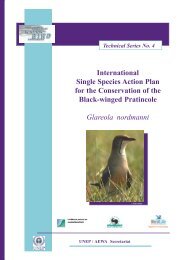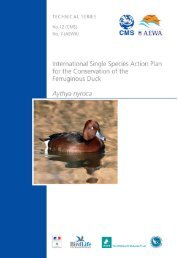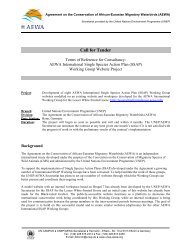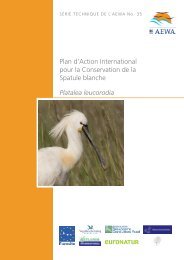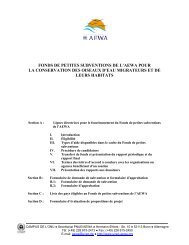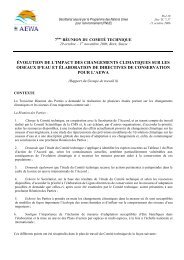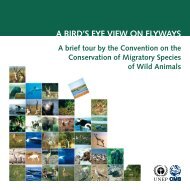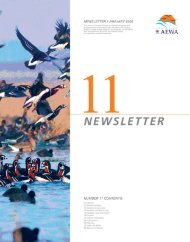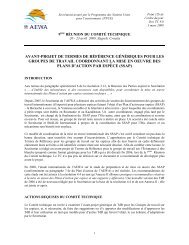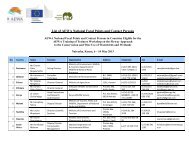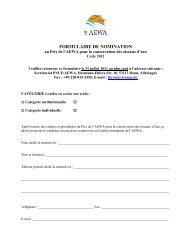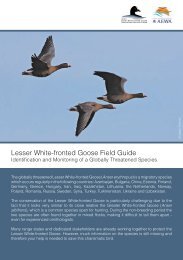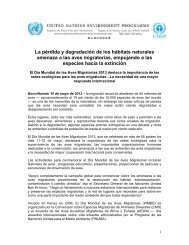International Single Species Action Plan for the ... - AEWA
International Single Species Action Plan for the ... - AEWA
International Single Species Action Plan for the ... - AEWA
Create successful ePaper yourself
Turn your PDF publications into a flip-book with our unique Google optimized e-Paper software.
<strong>AEWA</strong> Technical Series No. 36 - Annexes<br />
telemetry, as well as <strong>the</strong> financial implications and cost-effectiveness of <strong>the</strong> actions. In this<br />
respect, support from Norway may be requested too.<br />
Norway agreed on <strong>the</strong> refinement option with <strong>the</strong> rest of <strong>the</strong> birds from <strong>the</strong> free-flying flock<br />
remaining in <strong>the</strong> wild. At <strong>the</strong> same time <strong>the</strong>y required <strong>the</strong> establishment of a Committee <strong>for</strong><br />
LWfG captive breeding, reintroduction and supplementation in Fennoscandia. This<br />
Committee should be a sub-set of <strong>the</strong> <strong>International</strong> LWfG Working Group, which includes<br />
governmental representatives of Sweden, Finland and Norway, who would be free to bring in<br />
<strong>the</strong>ir own experts and use <strong>the</strong>ir support. The <strong>AEWA</strong> Secretariat offered to chair that<br />
Committee. The Committee should act as a plat<strong>for</strong>m <strong>for</strong> agreed and coordinated action of <strong>the</strong><br />
Fennoscandian countries with regard to <strong>the</strong> future of captive breeding and releases into <strong>the</strong><br />
wild, taking full account of <strong>the</strong> development of <strong>the</strong> remaining wild Fennoscandian population.<br />
A ToR <strong>for</strong> <strong>the</strong> Committee will be developed by <strong>the</strong> <strong>AEWA</strong> Secretariat, approved by <strong>the</strong> three<br />
states (Sweden, Norway, and Finland) and endorsed by <strong>the</strong> <strong>AEWA</strong> Technical Committee.<br />
(Note: Similarly to <strong>the</strong> <strong>International</strong> LWfG Working Group, <strong>the</strong> <strong>AEWA</strong> Secretariat would be<br />
in a position to efficiently chair <strong>the</strong> Committee <strong>for</strong> LWfG captive breeding, reintroduction and<br />
supplementation in Fennoscandia only if <strong>the</strong>re is additional support staff at <strong>the</strong> Secretariat<br />
(<strong>the</strong> Coordinator <strong>for</strong> <strong>the</strong> SSAP) and supplementary budget <strong>for</strong> travel to meetings of <strong>the</strong><br />
Committee, if <strong>the</strong> latter take place outside of Bonn)<br />
Finland also agreed with <strong>the</strong> compromise accepted by Sweden and strongly supported <strong>the</strong><br />
establishment of <strong>the</strong> Committee <strong>for</strong> LWfG captive breeding, reintroduction and<br />
supplementation in Fennoscandia.<br />
6) Pilot project <strong>for</strong> testing <strong>the</strong> method of reintroduction using ultra-light aircrafts<br />
The German NGO “Aktion Zwerggans” has initiated <strong>the</strong> idea of leading captive-bred LWfG,<br />
by ultra-light aircraft, along a flyway parallel to <strong>the</strong> one of <strong>the</strong> current free-flying flock from<br />
<strong>the</strong> Swedish Lapland, but to <strong>the</strong> Lower Rhine area in North Rhine-Westphalia in Germany.<br />
This would be a pilot experimental two-year project. In 2005 <strong>the</strong> Swedish Environmental<br />
Protection Agency issued a permit, which allows “Aktion Zwerggans” to operate in Sweden<br />
on this pilot project. In <strong>the</strong> pilot project it is planned to use birds from existing captive stocks<br />
(<strong>the</strong> only available at <strong>the</strong> time when <strong>the</strong> permit was issued), but <strong>the</strong> permit requires <strong>the</strong>m to be<br />
tested by three different methods <strong>for</strong> alien genes. However, no current method or even a<br />
combination of methods can guarantee that birds do not carry alien genes. It is also not<br />
guaranteed that during <strong>the</strong> flight no birds will deviate and escape into <strong>the</strong> wild, as it has<br />
happened in previous cases. There<strong>for</strong>e, <strong>the</strong> risk of again releasing hybrid birds into <strong>the</strong> wild<br />
still exists.<br />
At <strong>the</strong> meeting Sweden accepted <strong>the</strong> option of providing offspring of Russian wild birds from<br />
<strong>the</strong> new captive stock, which is being currently built up. This would require some<br />
postponement of <strong>the</strong> project, by at least three years, because no birds will be available earlier.<br />
Sweden was agreeable with <strong>the</strong> postponement of this pilot project.<br />
Both Norway and Finland welcomed this compromise.<br />
However, Sweden in<strong>for</strong>med that <strong>the</strong>y are not in a position to withdraw <strong>the</strong>ir permit, because<br />
<strong>the</strong>y will be facing legal and economical consequences, which <strong>the</strong>y would prefer to avoid.<br />
They expressed no opinion on if <strong>the</strong> German government could hold its permit, but<br />
highlighted that <strong>the</strong> project is valuable in providing an alternative and safer migration route<br />
and wintering site within <strong>the</strong> EU and in eliminating <strong>the</strong> risk of LWfG x Barnacle Goose pairbonding<br />
in <strong>the</strong> new Swedish captive-bred LWfG.<br />
The German Federal Ministry <strong>for</strong> <strong>the</strong> Environment, Nature Conservation and Nuclear Safety<br />
initiated a consultation in March with representatives of <strong>the</strong> NGO “Aktion Zwerggans” and<br />
<strong>the</strong> main sponsor of <strong>the</strong> pilot project Allianz Environmental Foundation. As a result of this<br />
<strong>International</strong> <strong>Single</strong> <strong>Species</strong> <strong>Action</strong> <strong>Plan</strong> Lesser White-fronted Goose –Annexes<br />
LV



